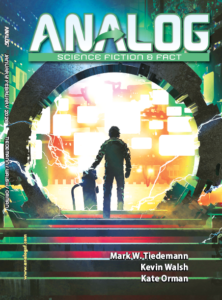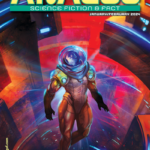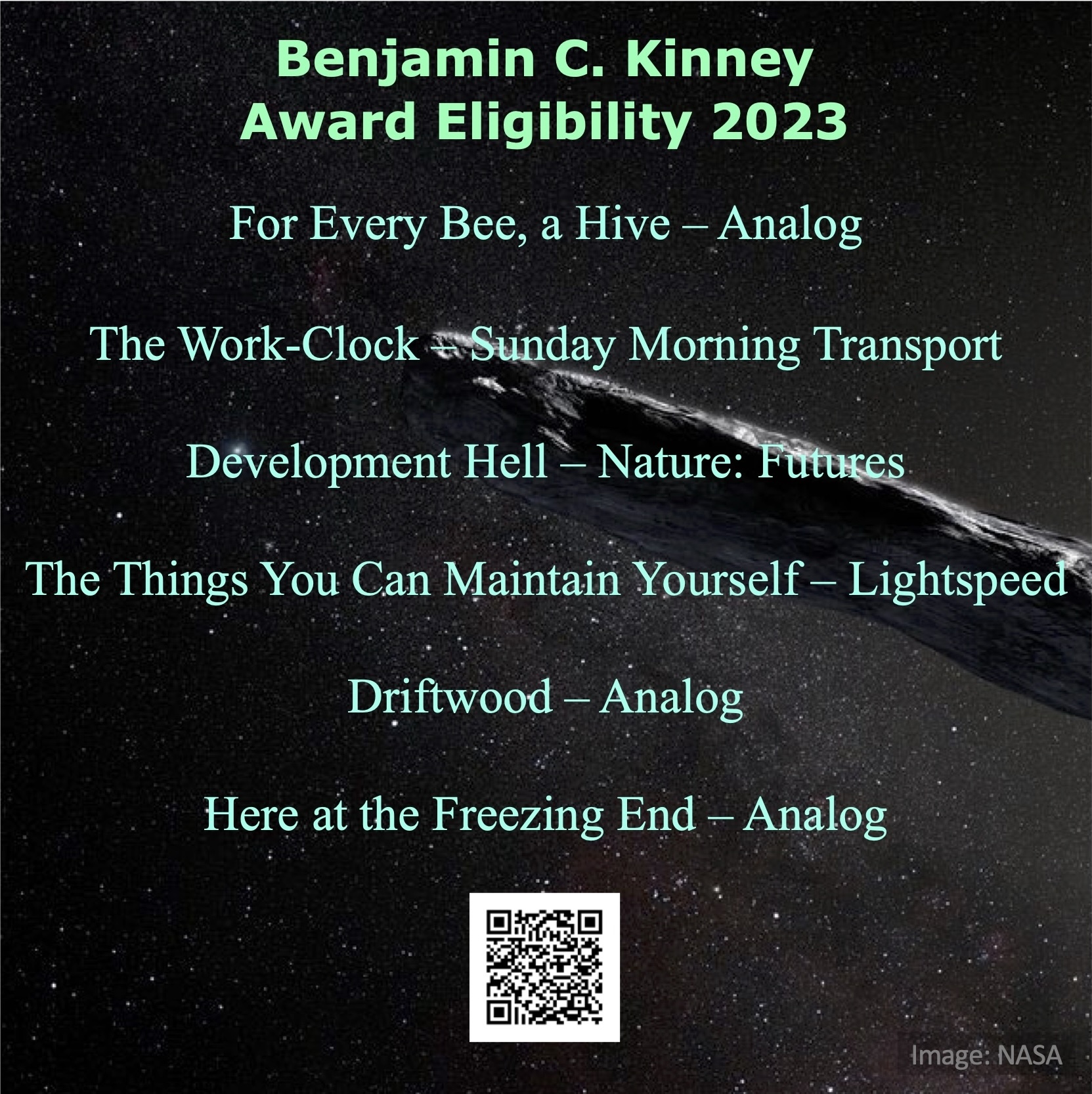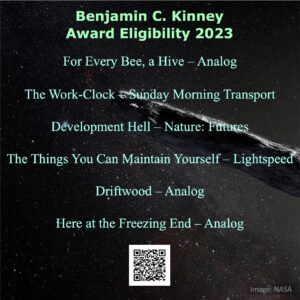Edit 2025: “For Every Bee, a Hive” is now available for free online at InkFoundry.
My short story “For Every Bee, a Hive” is out today (December 9, 2023) in the Jan/Feb 2024 issue of Analog Science Fiction & Fact! The online version is available now via the single issue or subscription. If you don’t have the spare cash to support Analog right now, you can also listen to “For Every Bee, a Hive” for free via the Analog podcast.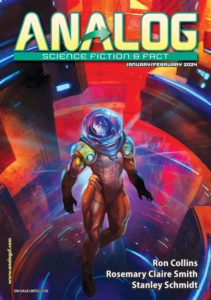
It’s a story about the space opera found family trope, and AI swarms, and all the tensions and similarities between those two concepts.
She wanted to pity this thing, with its cries for connection. But she shouldn’t anthropomorphize. According to that < archive check >, this AI’s faction didn’t build human-like consciousnesses. It didn’t feel lonely. It might not feel anything like humans did.
Not that she’d known what Agam had felt, when they’d declined to follow her.
This story also introduces my first ideas about human-centered neurotechnology. The future of “cyborg” technology means a lot to me as a neuroscientist who did his PhD work in early brain-machine interface technology. Science fiction and futurism often envision this technology as a way to enhance human cognition, but this always carries an unpleasant whiff of eugenics – what is “enhancement,” what do we value about the minds we have, how can we make sure those values encompass the full range of human diversity? This is why I think a “human-centered neurotechnology” means a conceptual shift away from enhancing human minds, toward supporting human minds.
For more on that and other author notes, keep reading. Don’t worry, no spoilers in there!
In “For Every Bee, a Hive,” the ‘free humans’ are cyborgs who alter their bodies to live in the outer solar system. This is part of a longstanding human tradition: ever since the first knapped stone axes, human beings have incorporated our technologies into our identity. Cybernetic modification would (will?) be just one more step in a long journey. As put by Tamar, protagonist of “For Every Bee, a Hive”:
The free humans had survived all these centuries by adapting. By taking new technologies into themselves and becoming what they needed to be.
Tamar’s people use neurotechnology not to enhance or supplant human cognition, but to support it by allowing humans to do more of what they do best. They are spatial thinkers, social thinkers, people who reach their best ideas by the interplay between concrete action and abstraction. Specifically, during this story you will see Tamar’s implants do the following:
- Improve interoceptive awareness of embodied cognition (e.g.
- Story example: Tamar’s biocognitive system
- Real-life example: all those times you listened to your ‘gut feeling’ – or wish you had
- Provide interactive kinesthetic experiences of abstract concepts
- Story example: Tamar directs her ship by throwing its icon at a target
- Real-life example: analyzing a plot (as a detective or a writer) is easier with an evidence/murder board with physical notes and string you can move and manipulate
- Introduce a ‘detachment gain’ by automatically moving ideas into space where you can observe them with your senses
- Story example: organizing radar data into a map of local space
- Real-life examples: creating a map, writing something down, presenting an idea in an image instead of text
- Unburden the mind from boring challenges like memorization
- Story example: Tamar’s archive checks
- Real-life example: who memorizes phone numbers anymore??
- Provide distributed memory & argumentative reasoning via a shared-access mental space for social error-checking and idea refinement
- Story example: Tamar and Bee double-checking her repair work
- Real-life examples: brainstorming with friends or colleagues, or every time you think “now that I say this out loud, it obviously doesn’t make sense”
My human-centered neurotechnology is greatly indebted to this article about how we offload cognition to other people/technologies (New York Times free gift link), which presents four “extraneuronal resources” for cognition: technology, the body, physical space, and social interaction.
The purpose of human-centered neurotechnology – what distinguishes its approach from more traditional cognitive enhancement – is that it recruits non-brain resources to support (and more widely deploy) the embodied, social cognition that humans do best. It’s not about thinking better or faster or differently, it’s about bringing more of the world in touch with the minds we have.
And now, four more story notes that aren’t related to the cyborgs and neuroscience:
First: This is the story I read at the Space Opera Themed Reading at ChiCon 8 (Worldcon 2022). So glad that people finally get the full story!
Second: This story takes place in the same universe as The Successors, Elegy of Carbon, and the manuscript my agent currently has out on submission. Those stories are all set elsewhere, among the AIs and the humans that Tamar thinks of as the AI’s pets! Those folks live a very pleasant space opera post-scarcity life; but given any paradise, someone’s going to want out of it, and that’s basically who Tamar’s ‘free human’ cyborgs are.
Third: I originally wrote this story with the visual labels as emoji: for example, instead of TREE, it said 🌲. A bit of a beast to publish it that way, sadly, but after a read-aloud attempt at ChiCon 2023, I realized the story works equally well with words.
Fourth: One reason the cyborgs split off from other humans is over religion. (The “other humans” get a passing reference in the story as “the androids’ pets.”) In the history of this world, there was a population crash, followed by an intentional (if potentially ill-advised) effort to homogenize humans into a single group. Those who secretly maintained their religious identity eventually split off into their own people, who became the cyborgs.
Why does that matter? Because it’s why Tamar’s people are crypto-Jews! Tamar probably doesn’t know what Judaism is, but her people are akin to the (subset of) Spanish conversos who, in the centuries after 1492, maintained a history of Jewish practices and traditions without understanding the origins of those traditions. Tamar’s ship name, The Year of the Trees, is a corruption of Tu B’Shevat. And I’m taking that concept in a different direction in my works in progress – be patient, it’ll be worth the wait!
Like this:
Like Loading...
